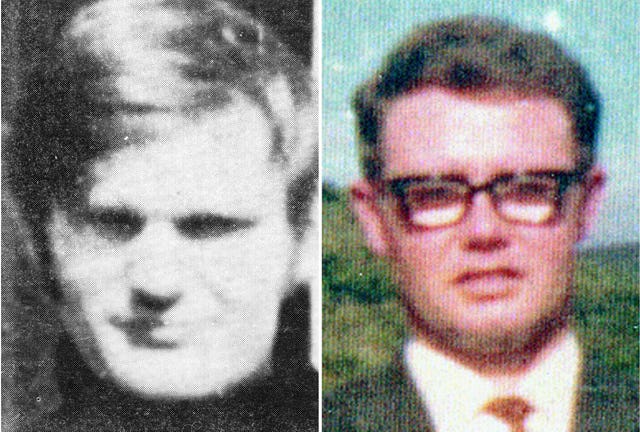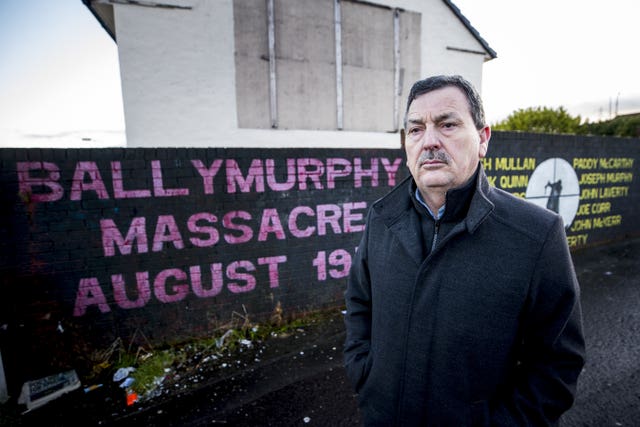The UK Government is expected to introduce a statute of limitations to end all prosecutions related to the Troubles before 1998 to stop Northern Ireland being “hamstrung by its past”.
Secretary of State Brandon Lewis will outline the approach in the House of Commons on Wednesday afternoon, as Government sources rejected claims it would amount to an amnesty for Army veterans and paramilitaries.
A Government source said: “We want to give Northern Ireland society the best chance of moving forward as one – to do that we must confront the difficult and painful reality that the realistic prospect of prosecutions is vanishingly small and while that prospect remains Northern Ireland will continue to be hamstrung by its past.

“Our legacy package will support Northern Ireland to move beyond an adversarial cycle that doesn’t deliver information or reconciliation for victims and survivors nor end the cycle of investigations against our veterans.”
Shadow secretary of state for Northern Ireland Louise Haigh, however, said Prime Minister Boris Johnson needed to explain the move.
“This Government gave victims their word – they would deliver the proper investigations denied to victims and their families for so long,” the Labour MP said in a statement.
“To tear up that pledge would be insulting, and to do so without the faintest hint of consultation with those who lost loved ones would be staggeringly insensitive.
“The Prime Minister should look victims’ families in the eye, and explain why he wants to close the book on their cases, and why they have been the last to be told about these proposals.”
More than 3,500 people died during the conflict, which stretched from the early 1970s to the Good Friday/Belfast Agreement in 1998, while tens of thousands more were left injured.
Earlier this month, Northern Ireland’s Public Prosecution Service (PPS) announced their intention to withdraw proceedings against two former soldiers – Soldier F for the murder of two men during Bloody Sunday in 1972 and Soldier B for the murder of 15-year-old Daniel Hegarty six months later.
It followed a review of the cases by the PPS in light of a recent court ruling that caused the collapse of another Troubles murder trial involving two military veterans.
The Crown cases against Soldier F and Soldier B hinged on evidence of a similar nature to that ruled inadmissible in April’s trial of Soldier A and Soldier C for the 1972 murder of Official IRA leader Joe McCann in Belfast.
A legal challenge to the decision to withdraw proceedings against Soldier F is ongoing.
Last month, Mr Lewis and Irish Foreign Affairs Minister Simon Coveney announced a new process by the two governments on legacy.
Families of victims, political parties and other stakeholders are to be involved.
Mr Lewis then said the process will “build on and develop on the principle of the Stormont House Agreement”.
In 2014, the Stormont House Agreement proposed a Historical Investigations Unit to examine unsolved murders during the Troubles and an Independent Commission on Information Retrieval for families to learn more about the fate of their loved ones.

The families of those killed by soldiers in west Belfast in 1971 have urged against a statute of limitations on Troubles prosecutions.
A fresh inquest into the deaths of a woman and nine men in Ballymurphy found they were “entirely innocent”.
“We see this as the British Government’s cynical attempt to bring in an amnesty and a plan to bury its war crimes,” the families said in a statement.
“The Ballymurphy Massacre inquest findings in May this year is the perfect example of why there should not be a statute of limitations.
“Justice Keegan confirmed what the Ballymurphy Massacre families always stated, that all those who lost their lives in the Ballymurphy Massacre were ‘entirely innocent of any wrongdoing’ and ‘posed no threat’.
“This is a war crime and those responsible must be held to account.”
Sandra Peake, chief executive of the Wave Trauma Centre, said a statute of limitations “removes the glimmer of hope” from victims seeking justice.
She described it as “unfair” that victims were hearing updates about the process of dealing with the past through the media.
“In this line of work we talk about having victim-centred care, this has been far from that,” she told the BBC.
“There is further information coming out (tomorrow), it’s important to see that. We believe that if a statute of limitation comes, it is a defacto amnesty.
“Many do not have expectations of prosecutions but they do have expectations around investigations, and I think that removing prosecutions, you remove that glimmer of hope. That’s what families have talked to me about, removing the glimmer of hope that somebody will be held to account and they think that that is what is so wrong. We cannot allow that to happen.”




Why are you making commenting on The National only available to subscribers?
We know there are thousands of National readers who want to debate, argue and go back and forth in the comments section of our stories. We’ve got the most informed readers in Scotland, asking each other the big questions about the future of our country.
Unfortunately, though, these important debates are being spoiled by a vocal minority of trolls who aren’t really interested in the issues, try to derail the conversations, register under fake names, and post vile abuse.
So that’s why we’ve decided to make the ability to comment only available to our paying subscribers. That way, all the trolls who post abuse on our website will have to pay if they want to join the debate – and risk a permanent ban from the account that they subscribe with.
The conversation will go back to what it should be about – people who care passionately about the issues, but disagree constructively on what we should do about them. Let’s get that debate started!
Callum Baird, Editor of The National
Comments: Our rules
We want our comments to be a lively and valuable part of our community - a place where readers can debate and engage with the most important local issues. The ability to comment on our stories is a privilege, not a right, however, and that privilege may be withdrawn if it is abused or misused.
Please report any comments that break our rules.
Read the rules here